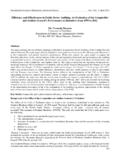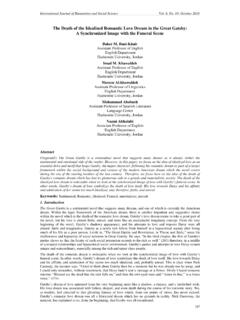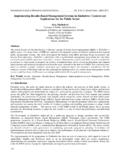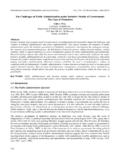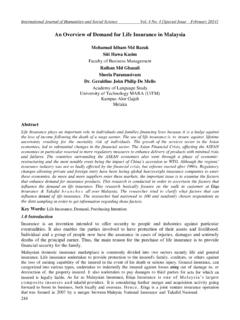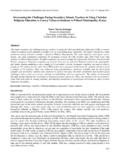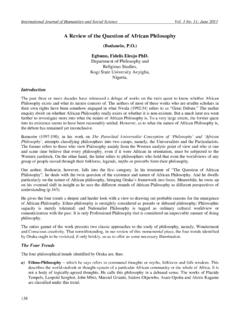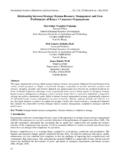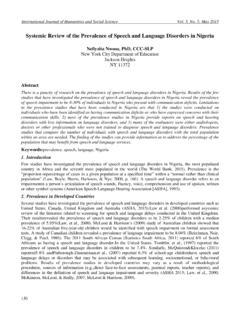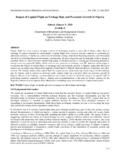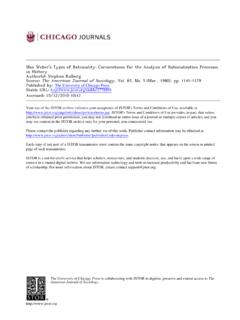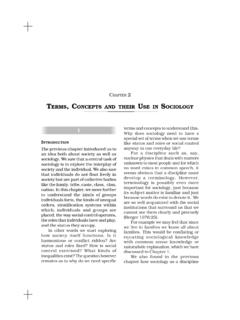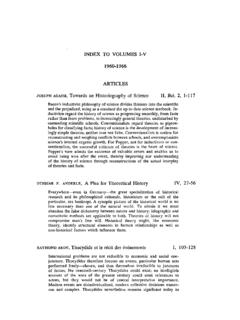Transcription of “Paradigm” as a Central Concept in Thomas Kuhn’s Thought
1 International Journal of Humanities and Social Science Vol. 6, No. 10; October 2016 47 paradigm as a Central Concept in Thomas kuhn s Thought Turkan Firinci Orman Assistant Professor Doctor Department of Sociology Baskent University Ankara, Turkey Abstract After having published The Structure of Scientific Revolutions, kuhn 's contribution has not only been a break with several key positivist doctrines but also triggered the growth of a new academic discipline the sociology of science. His idea that the development of science has periods of stable growth punctuated by the scientific revolutions is based on the cycle of normal science, crisis, and revolution.
2 For him, such regularity in the development of various sciences is a paradigm which he Thought to be a general feature of science. Thus, this study aims to analyze kuhn s Concept of paradigm as an intellectual framework which makes research possible. It is debated that the term could globally be understood as a disciplinary matrix in a sociological context whereas the term particularly refers to the concrete puzzle solutions which could be seen as exemplars of good science. It is showed that the process of paradigm change, for kuhn , leads to a scientific revolution. Finally, kuhn s argument on incommensurability of competing paradigms and the problem of objectivity are also discussed in order to show the problematic aspects of the Concept .
3 Key words: paradigm , scientific revolutions, disciplinary matrix, exemplar, incommensurability. 1. Introduction Thomas kuhn 's Structure of Scientific Revolutions (SSR) is believed to be one of the most important books in the 20th century. The book conceived a whole industry of commentary, interpretation, and exegesis. The growth of a new academic discipline the sociology of science- came into existence around a shared paradigm following kuhn s emphasis on the importance of communities of scientists. After the book was published researchers began to examine scientific disciplines much as sociologists studied social/cultural groups, and in which science was regarded not as the most esteemed, untouchable product of the Enlightenment but as just another subculture.
4 Yet, as kuhn claimed the philosophy and sociology of science cannot be practiced independently of each other (Hoyningen-Huene, 1992: 491). However, kuhn saw the communities (not individuals) as the basic agents of science and he Thought that communities must be characterized by the specific cognitive values to which they are committed. Until the 1950s, the hegemony of logical empiricism reached to its highest level- by the representatives of the logistic approach such as R. B. Braithwaite, Rudolf Carnap, Herbert Feigl, Carl G. Hempel, and Hans Reichenbach.
5 Prior to kuhn s SSR, historians and philosophers of science considered the scientific enterprise to be a rational endeavor in which progress and knowledge are achieved through the steady, daily, rigorous accumulation of experimental data accredited facts and new discoveries. But SSR served as an unparalleled source of inspiration to philosophers with a historical bent (Salmon, 1990). kuhn referred to this traditional approach as normal science, and he used the then-obscure word paradigm to refer to the shared ideas and concepts that guide the members of a given scientific field (Goldstein, 2012).
6 Therefore, it could be said that kuhn s SSR had been a sort of key document in both producing and preserving a deep division between the logical empiricists and those who adopt the historical approach. Afterthe 1960s and 70s, following kuhn s historiography, and philosophers such as Paul Feyerabend, Imre Lakatos, Larry Laudan and Michael Polanyi have greatly contributed to the creation of an anti-positivistic philosophy of science as a new tradition. History of science after kuhn has frequently taken a more consciously externalist line, in looking outside science for the causes of the content of science (Bird, 2012: 876).
7 Yet the book had more enemies than friends after it was published and even its friends, fellow historicists such as Imre Lakatos and Larry Laudan have almost invariantly tried to change or reformulate kuhn 's view (De Langhe, 2012: 12-13; Firinci Orman, 2016). When we look at kuhn 's Central claim in SSR it is that a careful study of the history of science reveals that development in any scientific field happens via a series of phases. The first he named normal science this phase, a community of researchers who share a common intellectual framework engage in solving puzzles thrown up by discrepancies (anomalies) between what the paradigm predicts and what is revealed by observation or experiment.
8 Most of the time, the anomalies are resolved either by incremental changes to the paradigm or by uncovering the observational or experimental error. And kuhn suggested major changes come about in scientific fields and conjectures that they probably do not evolve gradually from patient and orderly inquiry by established investigators in the field. Rather, he suggests, revolutions in science come about as the result of breakdowns in intellectual systems, breakdowns that occur when old methods won't solve new problems. He calls the change in theory that underlies this kind of revolution a paradigm shift (Hairstone, 1982).
9 But kuhn was never deeply engaged by the wider effects of his claims, the philosophical and historical critiques led him to specify more carefully just what he meant by paradigm and normal science. Even today the term paradigm is very controversial and kuhn himself revised its meaning and tried to answer his critiques questions. Yet, the effect of a paradigm term, as a Central Concept in kuhn s Thought has been very wide and strengthened the anti-positivistic philosophy tradition it belongs. ISSN 2220-8488 (Print), 2221-0989 (Online) Center for Promoting Ideas, USA 48 Thus, the aim of this study is to analyze the term paradigm in kuhn s Thought , especially with the stress on its meaning within the sociology of science.
10 To this end, firstly kuhn s sociological perspective of how science develops is tried to be revealed in order to see kuhn s position among the existing models of scientific development. Eventually, the paradigm term is analyzed stressing on two different senses of paradigm disciplinary matrix and examplar. It is also showed why the process of a paradigm shift, for kuhn , leads to a scientific revolution and the revolutionary stages of such shift are explained. Finally, kuhn s argument on incommensurability of competing paradigms and the problem of objectivity are also discussed in order to show the problematic aspects of the Concept .
